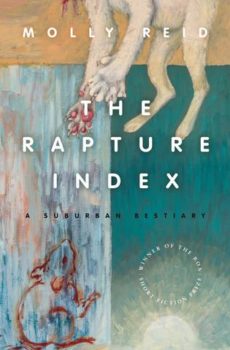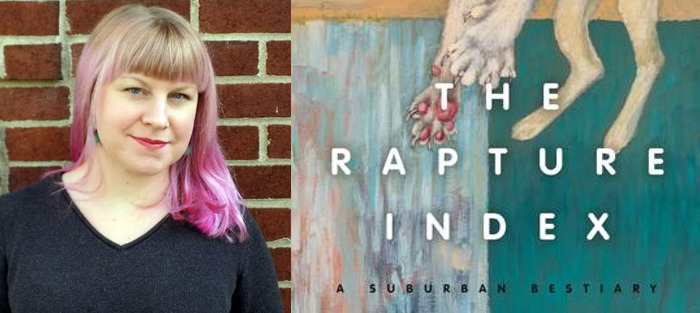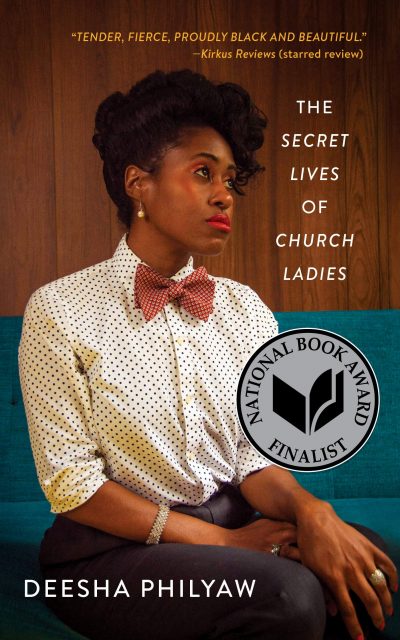“The Rapture Index,” the titular story from Molly Reid’s debut short story collection, The Rapture Index: A Suburban Bestiary (BOA Editions, 2019), is awash in anxiety and tension from line one. To be fair, this entire fascinating collection is wall-to-wall anxiety in the best way, focusing on some of my favorite things: death, the apocalypse, and weird animal interactions (in this book, alligators emerge from a pond to eat a bunch of people, a young girl deals with her father’s sudden death by making herself up to look like a corpse, a man struggles to come to terms with his girlfriend’s baby conceived after the apocalypse, and so on—you get the gist). But what’s so striking about “The Rapture Index,” in particular, is the way the narration and pacing work in concert to draw the reader in, make us a part of the narrator’s worry, her nagging sense that something is wrong in the world.
 Case in point: “The Rapture Index” begins with the narrator saying, “Do you think we should be more worried?” She says this to her husband, Henry, in reference to their son, Jeremy, a boy who is obsessed with the idea of the Rapture, tracking the signs of the apocalypse on the real-life website “The Rapture Index.” Jeremy is fixated on the Rapture, has become deeply religious, something that neither the narrator nor Henry has encouraged or wanted. Jeremy speaks in biblical terminology, is convinced the Rapture is nigh, and, oh yeah, carries around the paw of a dead cat. In my opinion, the narrator’s worry seems…well-placed.
Case in point: “The Rapture Index” begins with the narrator saying, “Do you think we should be more worried?” She says this to her husband, Henry, in reference to their son, Jeremy, a boy who is obsessed with the idea of the Rapture, tracking the signs of the apocalypse on the real-life website “The Rapture Index.” Jeremy is fixated on the Rapture, has become deeply religious, something that neither the narrator nor Henry has encouraged or wanted. Jeremy speaks in biblical terminology, is convinced the Rapture is nigh, and, oh yeah, carries around the paw of a dead cat. In my opinion, the narrator’s worry seems…well-placed.
Within the first few pages, Henry falls and cracks his head while on a family picnic, which ratchets up the narrator’s anxiety; although a trip to the ER reveals nothing to be medically wrong, her husband becomes obsessed with music, hears melodies in his head continuously, and is, the narrator notes, simply different. He has “…an energy, his body less disastrous, graceful even.” Linguistically, using the word “disastrous” here fits well, conjuring in name what the narrator fears within her own family. But it’s this nameless foreboding that takes up all the air in the story, this dread permeating the whole piece. There’s something off, the narrator is always insisting, but she can’t ever put her finger on what it is. (Besides the cat’s paw her son is obsessed with and always digging out of the trash, of course, but that’s an easy one.) “I continue rearranging the living room,” she says at one point. “There’s still something not quite right.” Making this seem environmental, elemental—the world around her, the story insists, is off in its very foundation somehow.
And nothing is right. Her husband insists on performing for friends in a backyard concert, displaying musical ability not present before his accident; her son insists that the scar on his forehead is in the biblical shape of the beast; a wildfire sheds ash all around their home, everywhere they go. Something is wrong, something is coming. The tension ratchets up. Jeremy keeps the cat’s paw in his desk at school. Henry loses his knowledge of the names of bones during a surgery. The wildfires grow worse, impacting the air quality, making everything sooty, darker. On their way to Jeremy’s school to meet with his teacher regarding the whole cat paw thing, the narrator points to a cloud of smoke, prompting this exchange:
I nod to it, a twisted arm pointing in our general direction. “The apocalypse.” We get out of the car, doors slamming shut in sync.
“Bring on the three-headed beast,” Henry says, and I’m relieved he isn’t angry anymore, or is at least pretending not to be.
The language of apocalypse is everywhere in this story, and the setting, with the suburban neighborhood backdropped by wildfire, certainly amps that up; I won’t spoil the ending, but this hellish, apocalyptic fury reaches a fever pitch at Henry’s backyard concert. The close first-person narration allows the reader to be thrown around in this narrator’s mind, believing what she believes, feeling her tension, her restlessness, her anxiety about her son and her husband and her marriage and the world around her. By the end, I was feeling anxious myself.
I love and admire this story because of that anxiety, because it takes the female narrator’s concerns seriously (something our society routinely does not do), because Reid takes such great pains to wrap us in the narrator’s everyday worries, and because, within those worries, all things are believable. I’m fascinated by the idea of the end of the world, the ways in which we as a species think it will come—I think we all are, on some level—and this story asks the reader to contemplate what that term, what that concept, truly means. What is the end of the world to us? Is it the end of a marriage? The end of our families as we know them? Is it the splintering of a relationship with a loved one? Or is it the literal Rapture? What these things mean to us is a huge question, and I love “The Rapture Index” because by the final line, the end of everything truly seems possible, seems like something inevitable, seems like something we will have to deal with. And that makes me anxious indeed.






